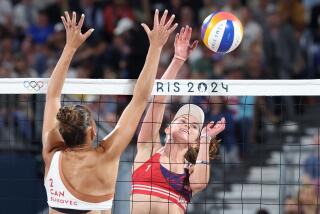Tours’ Agreement Erases Long-Standing Line in the Sand
- Share via
After nearly a decade of hostility, the world’s most significant pro beach volleyball tours have agreed to bury the hatchet in the sand.
The Assn. Of Volleyball Professionals and the Federation Internationale de Volleyball have agreed to avoid future clashes and, at the same time, have scheduled four major FIVB tournaments to be played in the U.S. over the next three years.
Under terms of the agreement, a grand slam event will be held in the U.S. in 2003, and two grand slam events will be held in the U.S. in 2004. All three events will be worth double the normal points toward the FIVB Olympic qualifying process.
In addition, the 2005 beach volleyball world championships will be held in the U.S., with at least $800,000 in combined prize money for men and women. Such a payout would be the highest in beach volleyball history.
The competing AVP and FIVB tours have had major clashes over the Olympic qualifying process since beach volleyball debuted at the 1996 Atlanta Olympics.
Wednesday’s announced agreement did not alter the controversial Olympic qualifying process--players can only make the Olympics by successfully competing in FIVB tournaments around the world during an 18-month span--but it appears to be progress.
“It’s monumental in many respects because there’s a history of less-than-cooperative relationships,” AVP Commissioner Leonard Armato said. “The fact the AVP and FIVB have decided to work closely and cooperatively bodes well for the future of volleyball.”
The tours’ pact to avoid scheduling major tournaments simultaneously should end longtime tensions.
In 1992, Sinjin Smith and partner Randy Stoklos were fined $70,000 by the AVP for playing in a tournament in Spain instead of an AVP tournament in Seal Beach. It was the first step in Smith’s eventual departure from the AVP to the FIVB.
More recently, Eric Fonoimoana and Dain Blanton were briefly suspended by the AVP in July 2000 because they played at an FIVB tournament in Italy instead of an AVP tournament at the same time in Muskegon, Mich.
Because the FIVB now recognizes the AVP as the official U.S. tour, it is expected to allow only U.S. players in good standing with the AVP to participate in FIVB events. It appears the top U.S. women’s team of Misty May and Kerri Walsh must join the AVP in order to also play FIVB tournaments.
May and Walsh eschewed the AVP this season in favor of more lucrative payouts on FIVB tournaments, among other things.
More to Read
Go beyond the scoreboard
Get the latest on L.A.'s teams in the daily Sports Report newsletter.
You may occasionally receive promotional content from the Los Angeles Times.







